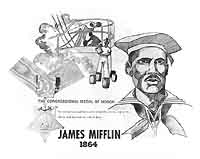Return to Naval Historical
Center home page.  Return to Online
Library Listing
Return to Online
Library Listing

DEPARTMENT OF THE NAVY -- NAVAL HISTORICAL CENTER
805 KIDDER BREESE SE -- WASHINGTON NAVY YARD
WASHINGTON DC 20374-5060

Online Library of Selected Images:
-- PEOPLE -- UNITED STATES --
Engineer's Cook James Mifflin, USN, (1839-????)
James Mifflin was born in 1839 in Richmond, Virginia. He enlisted
in the US Navy from the same state and served in the Civil War
on board USS Brooklyn. During the Battle of Mobile Bay,
Alabama on 5 August 1864, Mifflin stood fast and performed his
ammunition supply duties despite bursting enemy shells that swept
away men stationed nearby. For his conduct during this battle,
he was awarded the Medal
of Honor.
This page features the only image we have concerning James
Mifflin.
Click on the small photograph to prompt
a larger view of the same image.
Photo #: NH 103774
Engineer's Cook James Mifflin
U.S. Navy poster photographed in 1970. James Mifflin received
the Medal of Honor for remaining steadfast at his post on USS
Brooklyn while enemy shells cleared his shipmates at the
Battle of Mobile Bay, Alabama on 5 August 1864, which helped
to result in damage at Fort Morgan and the surrender of CSS Tennessee.
Official U.S. Navy Photograph, from the collections of the
Naval Historical Center.
Online Image: 75KB; 740 x 615 pixels |
 |
Medal of Honor citation of Engineer's Cook James Mifflin
(as printed in the official publication "Medal of Honor,
1861-1949, The Navy", page 39):
"On board the U.S.S. Brooklyn during successful
attacks against Fort Morgan, rebel gunboats and the ram Tennessee
in Mobile Bay, 5 August 1864. Stationed in the immediate vicinity
of the shell whips which were twice cleared of men by bursting
shells, MIFFLIN remained steadfast at his post and performed
his duties in the powder division throughout the furious action
which resulted in the surrender of the prize rebel ram Tennessee
and in the damaging and destruction of batteries at Fort Morgan." |
 Return to Naval
Historical Center home page.
Return to Naval
Historical Center home page.
Page made 28 April 2006
